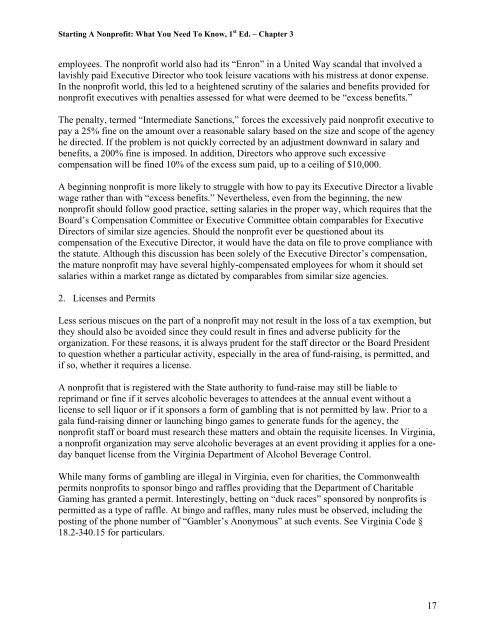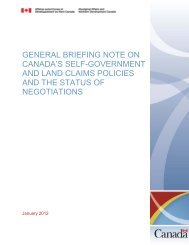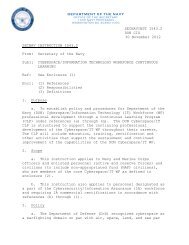HowToFormANonprofit_1st_ed-Chapter3
HowToFormANonprofit_1st_ed-Chapter3
HowToFormANonprofit_1st_ed-Chapter3
Create successful ePaper yourself
Turn your PDF publications into a flip-book with our unique Google optimized e-Paper software.
Starting A Nonprofit: What You Ne<strong>ed</strong> To Know, 1 st Ed. – Chapter 3<br />
employees. The nonprofit world also had its “Enron” in a Unit<strong>ed</strong> Way scandal that involv<strong>ed</strong> a<br />
lavishly paid Executive Director who took leisure vacations with his mistress at donor expense.<br />
In the nonprofit world, this l<strong>ed</strong> to a heighten<strong>ed</strong> scrutiny of the salaries and benefits provid<strong>ed</strong> for<br />
nonprofit executives with penalties assess<strong>ed</strong> for what were deem<strong>ed</strong> to be “excess benefits.”<br />
The penalty, term<strong>ed</strong> “Interm<strong>ed</strong>iate Sanctions,” forces the excessively paid nonprofit executive to<br />
pay a 25% fine on the amount over a reasonable salary bas<strong>ed</strong> on the size and scope of the agency<br />
he direct<strong>ed</strong>. If the problem is not quickly correct<strong>ed</strong> by an adjustment downward in salary and<br />
benefits, a 200% fine is impos<strong>ed</strong>. In addition, Directors who approve such excessive<br />
compensation will be fin<strong>ed</strong> 10% of the excess sum paid, up to a ceiling of $10,000.<br />
A beginning nonprofit is more likely to struggle with how to pay its Executive Director a livable<br />
wage rather than with “excess benefits.” Nevertheless, even from the beginning, the new<br />
nonprofit should follow good practice, setting salaries in the proper way, which requires that the<br />
Board’s Compensation Committee or Executive Committee obtain comparables for Executive<br />
Directors of similar size agencies. Should the nonprofit ever be question<strong>ed</strong> about its<br />
compensation of the Executive Director, it would have the data on file to prove compliance with<br />
the statute. Although this discussion has been solely of the Executive Director’s compensation,<br />
the mature nonprofit may have several highly-compensat<strong>ed</strong> employees for whom it should set<br />
salaries within a market range as dictat<strong>ed</strong> by comparables from similar size agencies.<br />
2. Licenses and Permits<br />
Less serious miscues on the part of a nonprofit may not result in the loss of a tax exemption, but<br />
they should also be avoid<strong>ed</strong> since they could result in fines and adverse publicity for the<br />
organization. For these reasons, it is always prudent for the staff director or the Board President<br />
to question whether a particular activity, especially in the area of fund-raising, is permitt<strong>ed</strong>, and<br />
if so, whether it requires a license.<br />
A nonprofit that is register<strong>ed</strong> with the State authority to fund-raise may still be liable to<br />
reprimand or fine if it serves alcoholic beverages to attendees at the annual event without a<br />
license to sell liquor or if it sponsors a form of gambling that is not permitt<strong>ed</strong> by law. Prior to a<br />
gala fund-raising dinner or launching bingo games to generate funds for the agency, the<br />
nonprofit staff or board must research these matters and obtain the requisite licenses. In Virginia,<br />
a nonprofit organization may serve alcoholic beverages at an event providing it applies for a on<strong>ed</strong>ay<br />
banquet license from the Virginia Department of Alcohol Beverage Control.<br />
While many forms of gambling are illegal in Virginia, even for charities, the Commonwealth<br />
permits nonprofits to sponsor bingo and raffles providing that the Department of Charitable<br />
Gaming has grant<strong>ed</strong> a permit. Interestingly, betting on “duck races” sponsor<strong>ed</strong> by nonprofits is<br />
permitt<strong>ed</strong> as a type of raffle. At bingo and raffles, many rules must be observ<strong>ed</strong>, including the<br />
posting of the phone number of “Gambler’s Anonymous” at such events. See Virginia Code §<br />
18.2-340.15 for particulars.<br />
17





